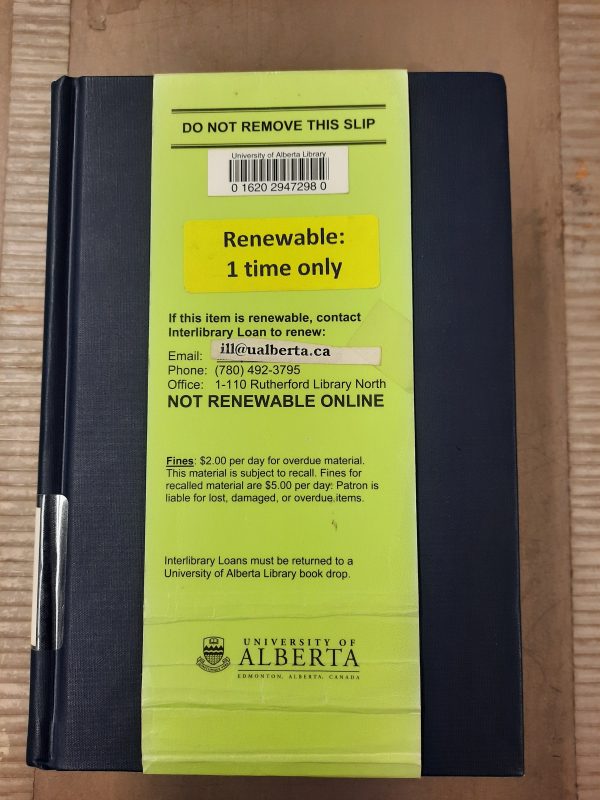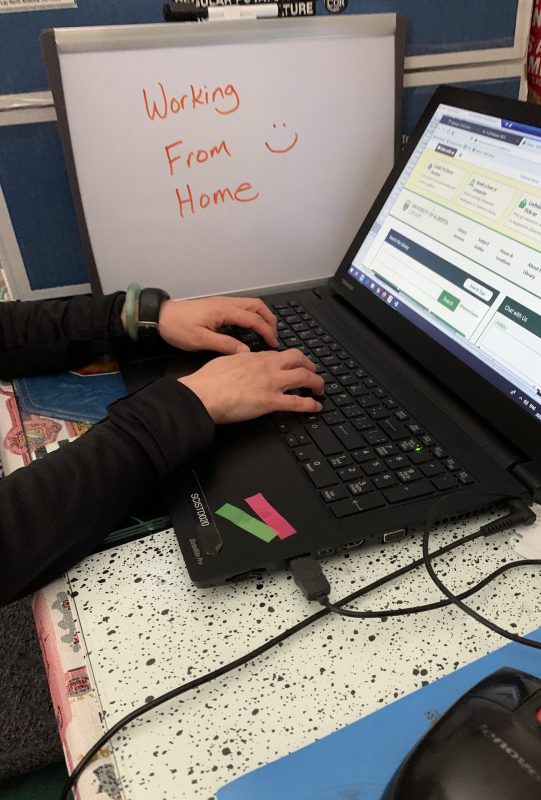With contributions by Alanna Scott

Photo Courtesy of Karen Hallett
The University of Alberta Library prides itself on its vast collections of print and digital material, and the materials available via our NEOS partners. Those of you who use the library typically find that we can fulfill a need for any kind of academic information: books, journals, reports, theses – you name it. But, what happens when we don’t have access to a specific item within our network of NEOS libraries? Well, we can get it for you from another library!
Interlibrary Loans (ILL) is a department within the library that researchers can use when their research inquiries go beyond what can be found locally. The University of Alberta Library belongs to a global community of libraries that share their material with one another, ensuring that if a particular resource is needed, we can get access to it. Interlibrary loans can be requested by all students, staff and faculty but are typically used by graduate students and faculty whose research requires a broad range of resources.
I teamed up with Interlibrary Loans Assistant Alanna Scott to give you a bit of a ‘behind the scenes’ glimpse of this department and the people who make it work.

So what exactly is an ILL, and when and where can you submit one?
Interlibrary loans are material that the library brings in from libraries in other parts of the world. This can include scans of articles, loans of books, as well as material like microfilm or music scores. Under normal circumstances, you can submit a request for an ILL when you’re looking for material that we don’t have access to via the University of Alberta or NEOS holdings. During COVID closures, students and staff can also use the ILL request form to request copies of articles or book chapters from journals or books held within the UAlberta collection. The ILL request form is located on our website.
What happens when you submit a request? What is the process?
Once your ILL request is received, it arrives in a search queue that is reviewed by ILL team members every day. We take a look at every request that is submitted, check to verify that it is not available in our collection or freely available online, try to make sure we have as complete a citation as possible, then route that request to libraries that may hold the item. The request moves through its routing list until one of the libraries on the list is able to supply us with the requested material.
Usually, libraries get back to us pretty quickly, but some items can be trickier to track down. We always begin by checking Canadian libraries, then move from there to American and other international libraries. Once we have received the material for your request, we either send a PDF via email or process the print book we’ve received so it can be borrowed.

What other things do ILL staff do that people may not know about?
One thing that probably isn’t too surprising and doesn’t come up as much is that we do process ILL requests that are submitted to us by other libraries, including scans of articles and loans of books. This includes urgent medical requests submitted to us by hospitals and clinics. Our library is doing its part to share our material with the rest of the world as well.
The ILL team is also responsible for registering students and staff for Distance Services so that books can be mailed to those who are completing their studies while living elsewhere in Canada.
We are also your Course Materials Team – we help make sure all of the reading lists are up and running, that all of the material is available for students and, when the campus is open, we’re the team responsible for placing books in the Course Materials rooms at the various libraries.
What are some interesting libraries that ILL’s come from?
If you receive an article that has been supplied in print rather than a PDF, we’ve probably received it from a German library or the British Library. These libraries are only able to supply in print, due to copyright restrictions, but they also have great collections that are sometimes the only place we can find material – particularly conference proceedings. We also receive items from the National Diet Library of Japan, Harvard, Yale, and various libraries in Australia, New Zealand and Italy.
Sometimes the best stories about tracking down an item are closer to home. We once were looking for a very specific publication and ended up phoning a small church in the Northwest Territories that the publication was about. They actually had a copy of the publication and were able to loan it to us! So we’ll try just about anywhere.
How are ILL staff working and managing during the pandemic?
We’re working remotely during the pandemic, which does change some of our work, but a lot of it remains the same. We’re still receiving requests, matching them with potential lenders, and sending them out. The biggest change is that since we’re not on campus we can’t process the print material requests that we receive, so the team on campus takes care of those.
One of the biggest challenges during the pandemic is that a lot of libraries around the world are still partially or fully closed, which can make it difficult to source material – especially loans of books. The availability of some items is constantly evolving.
Do you have any tips for members of the community waiting for ILL material?
Most of the requests process quickly through our system, but sometimes particularly tricky requests can take a long time when we have to ask, sometimes, dozens of international libraries if they’ll be able to supply. If you have been waiting for your book or article for a long time, you can always contact us via your request in your ILL account or via email ill@ualberta.ca and we can update you on the status. Rest assured, we are working hard on all of your requests. Sometimes we’re just at the whim of other libraries, and international postage.
And so there you have it – Interlibrary Loans is a great and often unseen team of people working to make research and learning easier for the University of Alberta community.
With thanks to CJ de Jong and Karen Hallett.
